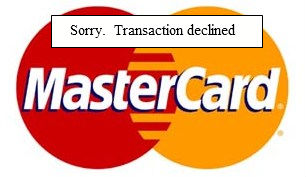Mastercard’s decision to block gambling transactions
 Kind of like the passing of UIGEA itself, Mastercard’s decision to start making concerted efforts to block US player online gambling transactions has taken the industry by real surprise.
Kind of like the passing of UIGEA itself, Mastercard’s decision to start making concerted efforts to block US player online gambling transactions has taken the industry by real surprise.
Much to the chagrin of online sports betting operators in particular, Mastercard decided to start blocking payments on the eve of the Super Bowl. This marks a major development that will change the internet gambling landscape in the US significantly for the time being, particularly if rumors that VISA are to follow suit have any truth to them.
But I would imagine that it is also a confusing development for many players. I mean, no laws have all of a sudden changed. UIGEA (Unlawful Internet Gambling Enforcement Act) was passed by George Dubbya back in 2006 and Mastercard payments seemed to have worked fine since then right? So lets just do a very quick re-cap on legislative, political and judicial developments that are relevant to the decision, as well as a couple of other little tit-bits that make it all the more interesting.
UIGEA
As noted above, UIGEA was passed by the Bush Administration as an attachment to the Port Securities Bill back in late 2006. Its passage through both Houses took quite a few commentators by surprise, and also smashed the share prices of all European based online gambling operators with significant US facing business.
The intent of UIGEA was to curb US player’s ability to play online. Now politicians are a crafty lot and well aware that outlawing the act of gambling online would be both unpopular and ineffective. America’s experiences with prohibition in the past serve as a pretty good lesson here. They were also aware that threatening operators with prosecution would, in all but a handful of cases, be fruitless since operators are invariably based outside the jurisdiction of US lawmakers.
So rather than target players or operators, they came up with the ingenious idea of targeting payment processors with a view to cutting the funding pipeline.
Good idea in principle, but the operative provisions of UIGEA threw up a few curly problems that would make practical enforcement very difficult and perhaps not so ingenious after all. Of particular concern was the fact that:
- while the law renders the act of processing payments with regard to ‘unlawful online gambling’ illegal, nowhere in the Act does it define what ‘unlawful online gambling’ is; and
- notwithstanding the absence of a definition of ‘unlawful online gambling’, the task of identifying and blocking related payments is left to the payment processors!
In light of the above, America’s financial services industry has long been dreading the the day this law was set to come into effect, claiming they are totally ill-equipped to comply.
Now while the law was originally legislated to come into effect in December 2009, this deadline was pushed back to June 1, 2010 after much last minute scurrying inside Washington’s corridors of power. The delay was approved by Treasury Secretary Timothy Geithner and Fed Reserve Chief Ben Bernanke, following a written request from senior politicians lead by Financial Services Committee Chair Barney Frank as well as no doubt some pressure from the financial services industry who needed this additional administrative burden like a hole in the head mid-GFC.
So while the requirement to block payments (albeit in an unworkable, confusing way) had become law, and the spectre of this law’s imminent implementation hangs like the Sword of Damocles over the online gambling and financial services industries, right now obligations to comply don’t yet exist.
Further, there is a strong push in Washington, lead by Barney Frank, to have UIGEA repealed and replaced with online gambling regulations that would open the US market up to licensed operators.
So why the big move Mastercard?
Well, no one is certain about this and Mastercard haven’t yet let on. The strong mail is that it has something to do with a recent Court of Appeals decision concerning the prosecution of Douglas Rennick, a Canadian man who allegedly processed over $350 million in online gambling payments for US players and is being charged with bank fraud and money laundering.
But this is only speculation, and I’m sure more will come to light in coming months.
But wait a minute, what’s this?
A very interesting little footnote this development is the establishment of a small US based payment processing company, Secure Trading Inc. Secure Trading has been set up by parent company UC Group as its US facing payment facilitator for online gambling transactions. UC are taking the punt that the regulatory environment in the US is soon to change and Secure Trading is being set up to capitalize on this change.
Now this wouldn’t bear mentioning but for the fact that the management team UC have poached to head Secure Trading are ex senior Mastercard executives.
Coincidence? Probably, but the timing makes does make it juicy.
So what does this all mean for US players?
At least for the time being, depositing at your chosen poker room, casino or sportsbook just got a whole lot harder – and it’ll get worse if VISA jumps on board with the blocking measures also.
Of course other US player deposit options do exist, and I’m sure more will pop up to fill the void left by the credit card companies but they will not be without their complications. For example, UseMyWallet and eWalletXpress, e-wallets known to support US gamblers may themselves be considered online gambling transactions, and Mastercard and/or VISA may block payments funding these accounts.
One thing is for sure, the next few months leading up to June 1 will be very interesting indeed!



Leave a Reply
Want to join the discussion?Feel free to contribute!